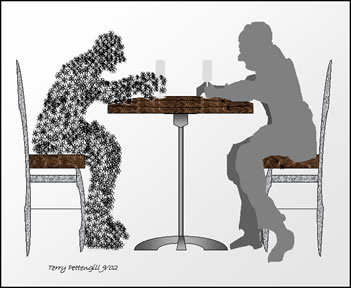
Lately, I've been playing around with the fanciful idea of the "atomic friend." This is not about nuclear energy, it's about how we perceive the world. When we look across the table at somebody we're having dinner with, for example, we don't see that person or friend as photons cast in our direction — we see facial expressions. Likewise, we don't perceive sound vibrations, instead we're aware of words and tones of voice, which themselves are as full of meaning as facial expressions are full of meaning.
This view of the "atomic friend" is something we get from subatomic physics, our perception of ultimate reality below what we experience in daily life. It's sometimes referred to as reductionism — the idea that we can define things at a level and say, it's nothing but that, it's nothing but photons, it's nothing but sound vibrations. Yet that's not how we experience life. We experience it with meaning, and love.
The same reduction process happens very commonly in modern society, without the benefit of any knowledge of subatomic physics. We just have to look at the sophisticated games people play around money and power, for instance. Instead of appreciating a child's requirement for love, many people simply give the child toys and money as a substitute for love. They've reduced the relationship to a very quantifiable thing called money, saying "Well, I can't afford to really spend time with you" — that's a subconscious thought, of course — "I can't afford to really spend time with you, but I can give you money, because that's what I'm spending my time doing, and here's the money that expresses my love." Well, somehow the love gets lost in the experience. It's like reducing facial expressions to photons.
It's the same with manipulating people as pawns in power games, in order to aggrandize one's own self or ego. One can manipulate hundreds or thousands of people as an executive, without much concern at all for the feeling experience of the manipulations — like moving a factory from one part of the world to another without experiencing or even paying attention to those things, because we've reduced it to a game of money and power, saving money, or the wonderful joy of the power, being able to move all those materials and people from one place to another. Thes behaviors, I like to say, are truly unconscious.
by Peter Good. Cartoon by Terry Pettengill.

No comments:
Post a Comment